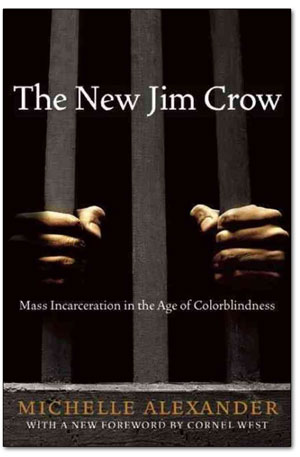 |
|
Alexandria Bombach shoots some footage for her upcoming film "Frame by Frame" in Afghanistan. Bombach and fellow filmmaker Mo Scarpelli are seeking funds to finish filming the movie, which follows photographers in the country, where photogrpahy was outlawed under the Taliban until 2001./Photo courtesy Alexandria Bombach
|
Flying under the radar
The New Jim Crow points to modern system of racial injustice
by Missy Votel
It's been 50 years since Marin Luther King Jr. delivered his "I Have a Dream" speech, paving the way for the dismantling of Jim Crow throughout the South.
But did Jim Crow ever really go away?
Sure, today Americans can look back at 1963 and reflect on how far the country has come – including its first black president. But there are some who say there is still a long way to go toward true racial equality. Not only are voter rights being challenged in many states, but the War on Drugs has helped usher in a new era of institutionalized racism, made even more insidious because it hides in plain sight.
In her 2012 New York Times bestseller, The New Jim Crow: Mass Incarceration in the Age of Colorblindness, author and law professor Michelle Alexander argues that racial profiling, criminalization and mass incarceration of black men have created an inescapable caste system, whereby people of color are relegated to second-class status.
|
"The War on Drugs and Mass Incarceration: Today's Disguised Racism:"
|
Alexander's book, which has been featured on NPR and praised as "The Bible of a social movement" by the San Francisco Chronicle, will be the topic of a community reading program and discussion sponsored by the Unitarian Universalist Fellowship of Durango and Maria's Bookshop. The weeklong event kicks off Fri., Sept. 13 with a screening of the acclaimed documentary and Sundance 2012 Grand Jury Prize winner, "The House I live In," a sobering look at the human repercussions of America's failed drug war. The following week, on Sept. 20, there will be an airing of a 2012 lecture Alexander gave at the Justice General Assembly in Phoenix. The presentation will be followed by a discussion led by Nancy Stoffer, coordinator for diversity programming at Fort Lewis College and vice-chair of Durango's Community Relations Commission.
Maureen Maliszewski, the Social Justice Committee Co-Chair at the UUFD and organizer of the event, said the timing is especially fortuitous. Not only does it coincide with the anniversary of the March on Washington, but new challenges to voters rights in several states as well as talk of reducing mandatory sentences for drug-related crimes.
"It's timely because the March on Washington was about jobs and justice, but as we look around today, do we really have racial justice?" she asked.
Case in point: according to statistics cited by Alexander, more than half of black men in America's largest metropolitan areas are or have been in jail or prison, with some cities, such as Washington D.C., as high as 90 percent. And even though blacks comprise just 13 percent of the U.S. population and 14 of drug users, they comprise 56 percent of those incarcerated for drug crimes.
Most incarcerations are the result of minor drug offenses that, with the advent of the War of Drugs, became classified as felonies. Over the past 40 years, the War on Drugs has cost more than $1 trillion and accounted for more than 45 million arrests. In fact, between 1973-2009, the nation’s prison population grew by 705 percent, resulting in more than 1 in 100 adults behind bars today.
However, the problem does not lie solely with booming prison populations. Once released from prison, convicted felons are effectively barred from participating in society. Not only are they ineligible to vote, they are unable to get public benefits, such as food stamps, and often excluded from employment, housing and even serving on a jury, much like their forefathers.
"After they get out, their lives are basically ruined," said Maliszewski. "There are all these laws, that until you run up against them, you probably wouldn't know about."
Maliszewski said the book, which was recommended by several others at the fellowship, was eye-opening to say the least. However, she was not the only one to have an epiphany over the similarities between the system of inequality and Jim Crow laws of old. Alexander, herself an African American civil rights lawyer and activist, said her eyes were closed to the problem of racial discrimination until she began working as the director of the Racial Justice Program for the Northern California ACLU more than a decade ago. By the time she left her post, she had begun connecting the dots between mass incarceration and earlier forms of social control.
"Quite belatedly," she writes, "I came to see that mass incarceration in the United States had, in fact, emerged as a stunningly comprehensive and well-disguised system of racialized social control that functions in a manner strikingly similar to Jim Crow."
For Alexander, the real work lies in enacting lasting social change to help those "trapped in a parallel social universe in which discrimination is perfectly legal." Nothing short of a major social movement is required, she asserts, mere "tinkering with the machine" with piecemeal and "color-blind" approaches simply won't do.
Of course, recognition is the all-important first step, making Marin Luther King's decades-old words more relevant than ever: "You don't need to se the staircase, just take the first step."
In this week's issue...
- January 25, 2024
- Bagging it
State plastic bag ban is in full effect, but enforcement varies
- January 26, 2024
- Paper chase
The Sneer is back – and no we’re not talking about Billy Idol’s comeback tour.
- January 11, 2024
- High and dry
New state climate report projects continued warming, declining streamflows
